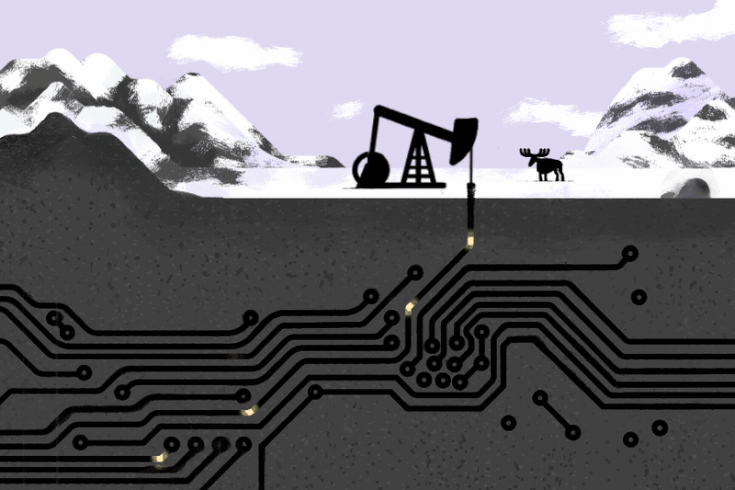Last Halloween, I walked into my Calgary office building’s loading bay in search of a lost bicycle and instead found eight discarded computers. On a whim, I decided to rent a car to take them to my shoebox apartment in Chinatown, strip them for parts, and build cryptocurrency-mining machines. I had grown up with an engineer father who involved me in electrical work; I knew how to build a computer even before my voice broke. So, although I was new to mining—in essence, running computers that facilitate cryptocurrency transactions—I understood the basics, and I googled the rest. Soon, I lived in constant fear that my landlady would complain about the amount of electricity my new machines were sucking up (enough to power a house). Running them around the clock produced a lot of heat, to the point that, even in winter, I kept a window open to my balcony and slept without a blanket.
Back then, on top of being a long-time investor in Bitcoin, I was also a full-time journalist covering oil, and my life was tied to the energy industry. Day in and day out, I would read and write about energy and talk with oilmen and oilwomen. Alberta produces nearly all of Canada’s oil, and it has gotten rich off it, frequently boasting some of the country’s highest incomes. But the province was hit hard when, in 2014, global oil production increased and demand declined. Per-barrel prices tumbled by more than 70 percent over two years. Over time, as oil and gas became a smaller portion of Alberta’s economy, I realized that the province could become fertile ground for a new multi-billion-dollar industry: cryptocurrency mining.
Mining is the process of running computers to support the digital network of a cryptocurrency such as Bitcoin. When someone sends or receives Bitcoins, unlike in a transfer of traditional currency, there is no bank or payment provider to process and document the exchange. Instead, Bitcoin has miners, who collectively validate the transactions and add them to the blockchain, a tamper-proof ledger secured with cryptography, that serves as the official record. Miners are rewarded for their contribution to the blockchain with newly created units of the currency, giving them a substantial financial incentive to do their work.
Because of the digital currencies’ use of cryptography, which keeps the activities secure but requires computing a huge number of functions in a short amount of time, adding new transactions requires massive amounts of power. One estimate shows Bitcoin miners worldwide use enough electricity in a year to power more than 5 million American homes.
A successful mining operation needs cheap electricity and a cold environment. Alberta is one of the few places in the world to have both; I was in the right place. Last December, finding it increasingly hard to do two things at once, I quit my day job and moved my computers into a warehouse shared with a coffee supplier. On blue-and-orange racks that once held coffee, I now run rows upon rows of cryptocurrency-mining machines.
It is hard to gauge the total size of Alberta’s mining industry, due to its lack of organization. Cryptocurrency in general is a notoriously secretive business: transactions are often hard to trace and always irreversible. Through contacts, I know the field in Alberta is massive and growing. Dave Bradley, an “old-school Bitcoin guy” who has a hand in several local cryptocurrency initiatives, says that “three, four years ago, there were maybe a dozen house miners in the Calgary area”—hobbyists who run a few machines out of their homes, like me in my Chinatown apartment. “Now there’s got to be at least close to a dozen small commercial setups,” he says.
Last year, the Bitfury Group—one of the world’s biggest cryptocurrency-mining companies, headquartered in the Netherlands—announced a plan to set up possibly North America’s biggest mining facility in Drumheller, 135 kilometres northeast of Calgary. Bitfury’s partner, Hut 8 Mining, started operating in late December. In mid-January, the company had already earned more than 200 Bitcoins (over $2 million). It’s now setting up another facility near Medicine Hat. The Alberta oil-and-gas producer Iron Bridge Resources has also entered the mining game: a couple of months ago, it announced it would run computers with electricity generated from its own natural-gas supplies. Given today’s low energy prices, the company says, cryptocurrency mining gets more value out of its product than selling it would. Iron Bridge’s stock rose 16 percent after the announcement.
This coming summer, right before the week-long Calgary Stampede—which, among other things, brings in oil executives for a series of corporate parties— a local startup will hold the first “Bitcoin Rodeo” industry conference, where insiders will network and attend various presentations about cryptocurrencies. Alberta, once known mainly for oil, is fast becoming a different kind of Wild West.
My story began with oil. For six weeks in 2016, I worked in a wire news service’s New York office and covered the international oil markets. My time there taught me to better read charts and understand market forces, but it also taught me a mindset: be steely and unemotional no matter how sharply the market’s tide turns. It sounds simple, but when you have skin in the game, it’s hard to divorce your feelings from the outcome. Yet the traders I spoke with in New York were mostly Zenlike, level headed even on their worst day. There is a term for that in cryptocurrency circles: “HODL,” a misspelling of “hold,” which describes iron-faced stoicism and resistance to the urge to sell in the face of sharply falling prices— which are uncommon in traditional markets but a frequent occurrence when it comes to cryptocurrencies. Just this year, Bitcoin fell 40 percent and rebounded within two weeks.
Oil could be called the Bitcoin of the traditional markets—it is traded largely on paper, without physical delivery, and its price fluctuations are considered volatile. So it was on the cryptocurrency holdings I’d had for years that I practised the trading lessons I’d learned in New York, and increasingly, I barely cared about or noticed my journalist’s salary. I worked my last day on December 22, 2017, one year after I wrote a story with the headline, “Industry confidence low in Canada’s oil sands as Statoil, Koch exit.” At the same time, the mining operation Hut 8 took possession of its machines in Drumheller.
That town has been hit hard by the commodities crash, much like the rest of Alberta, which in 2015 alone shed an estimated 35,000 jobs. At its peak, last March, the unemployment rate for the greater Camrose-Drumheller region nearly doubled from pre-2014 levels to 9.9 percent, over one-third higher than the national average, according to Statistics Canada. “Like all small towns in Alberta, we’ve been struggling,” says Julia Fielding, Drumheller’s economic-development and communications officer.
But also like the rest of Alberta, powered mostly by an abundance of natural gas or cheap coal, the Drumheller area offers some of the best rates for power in the world. Sean Clark, who stepped down as CEO of Hut 8 last month, says Bitfury and Hut 8 have negotiated natural-gas-powered electricity for 4.5¢ per kilowatt hour—compared to the national residential average of about 20¢, according to the World Energy Council. The average American rate is 27¢, while in Europe it can easily go beyond 30¢. Cheaper power means daily savings by the thousands. For Drumheller, the miners’ arrival has created at least thirty jobs, according to both Fielding and Clark. That’s the equivalent of an oil company.
Even the most bullish enthusiasts say cryptocurrency mining can never truly replace oil and gas in Alberta, a sector that directly employs 140,300 people and makes up 17 percent of the province’s $300 billion economy. But Canada’s resource-extraction industries have seen turmoil—and if the province doesn’t harness the opportunity provided by cryptocurrencies, it’s in danger of losing its advantage. In February, as word spread of a potential cryptocurrency crackdown in China (which exercises strict capital controls and perennially talks about reining in digital coins), Bitmain, a mining company there, said it was eyeing alternative sites in Canada—not in Alberta but in hydro-powered Quebec. Bitfury and Hut 8 say they’re looking east as well.
“We’ve got to be proactive,” Bradley, the entrepreneur, says. His company, Bitcoin Brains, has been working with “major industrial players” in Alberta to find cheaper electricity. Meanwhile, Alberta’s government—which prides itself on being a champion of pipelines for the oil industry and, at the same time, being focused on diversification—has hardly said a word publicly about the cryptocurrency boom. But it is paying attention. “Bilous was talking to me about this just yesterday,” a spokesman for economic-development minister Deron Bilous told me in January.
I run a cryptocurrency meet-up group in Calgary that began with a bunch of people in a pub last year and has burgeoned to more than 300 people. My cryptocurrency network is so big, I have a more exclusive meet-up group within that meet-up group. Every time I hold events, I see new faces, and every once in a while, I hear of new mining operations starting up.
One fledgling operation is NovumX, run by two oil-and-gas professionals in Calgary who met on a project three years ago. Last year, they were mining in a warehouse with thirty machines. Now they are talking about a facility with sixty megawatts, roughly equivalent to more than 50,000 homes. Many miners are like them and like me. We were trained in and became good at something else, we applied that to something new, and now we’ve decoupled our fortunes from oil and gas.
The Writers’ Trust of Canada supported the author of this story.





